The Communist Manifesto: Capitalism's Destructive Force
VerifiedAdded on 2022/11/01
|7
|1833
|264
Essay
AI Summary
This essay provides an in-depth analysis of Karl Marx and Friedrich Engels' The Communist Manifesto, focusing on their depiction of capitalism as a destructive force. The essay argues that the Manifesto highlights how capitalism undermines social stability by prioritizing wealth accumulation over the well-being of workers. It examines the concept of class struggle, the exploitation of the proletariat by the bourgeoisie, and the inherent instability of a capitalist system driven by profit. The essay emphasizes Marx and Engels' call for workers to unite and challenge the capitalist system to establish a more egalitarian society where the means of production are controlled by the workers themselves. The essay concludes that the Manifesto effectively portrays how capitalism disrupts social life and calls for a revolution to address these issues. The essay also references the authors' views on overproduction and the negative impacts on the working class. The essay's ultimate goal is to provide an understanding of how capitalism impacts society and social stability.
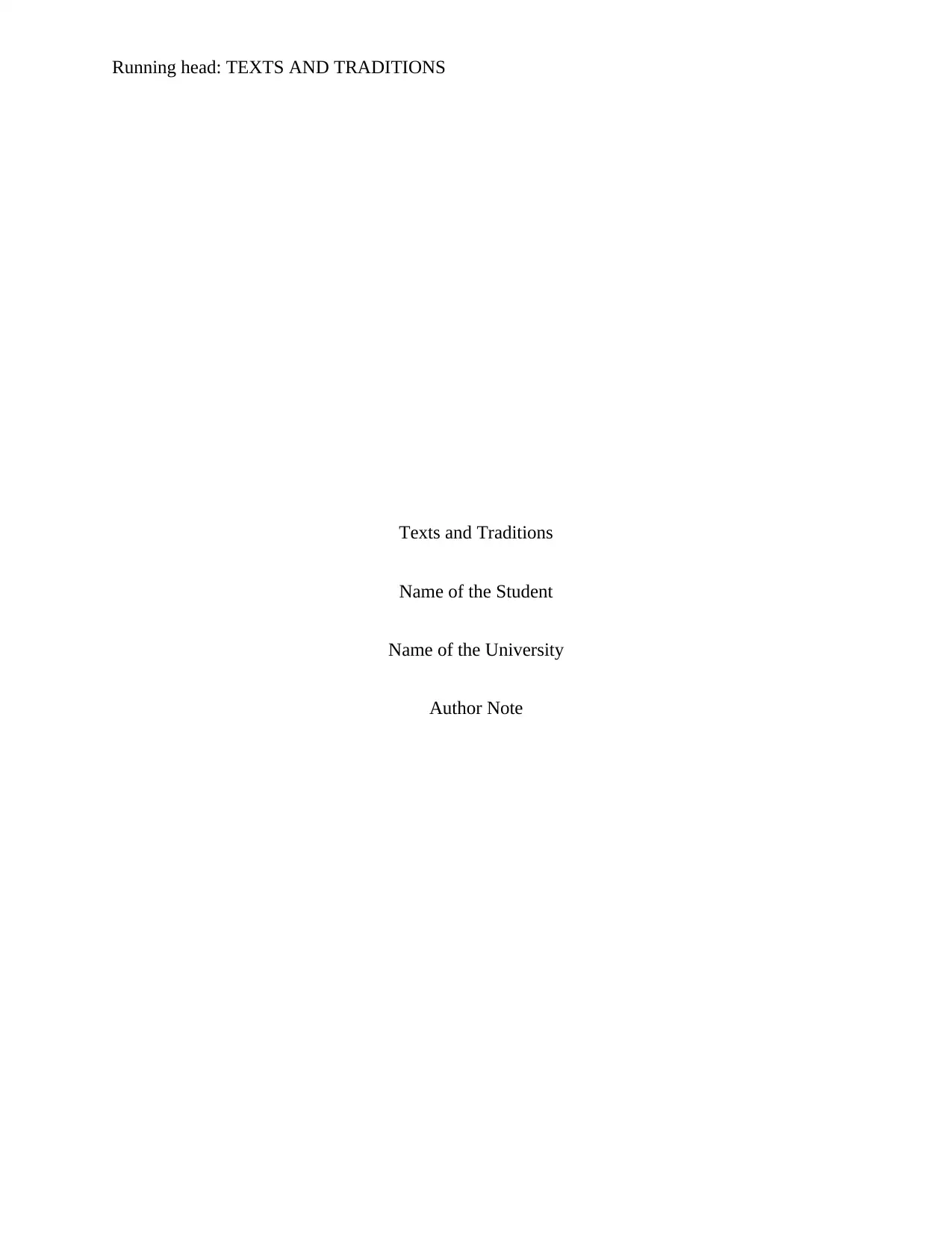
Running head: TEXTS AND TRADITIONS
Texts and Traditions
Name of the Student
Name of the University
Author Note
Texts and Traditions
Name of the Student
Name of the University
Author Note
Paraphrase This Document
Need a fresh take? Get an instant paraphrase of this document with our AI Paraphraser
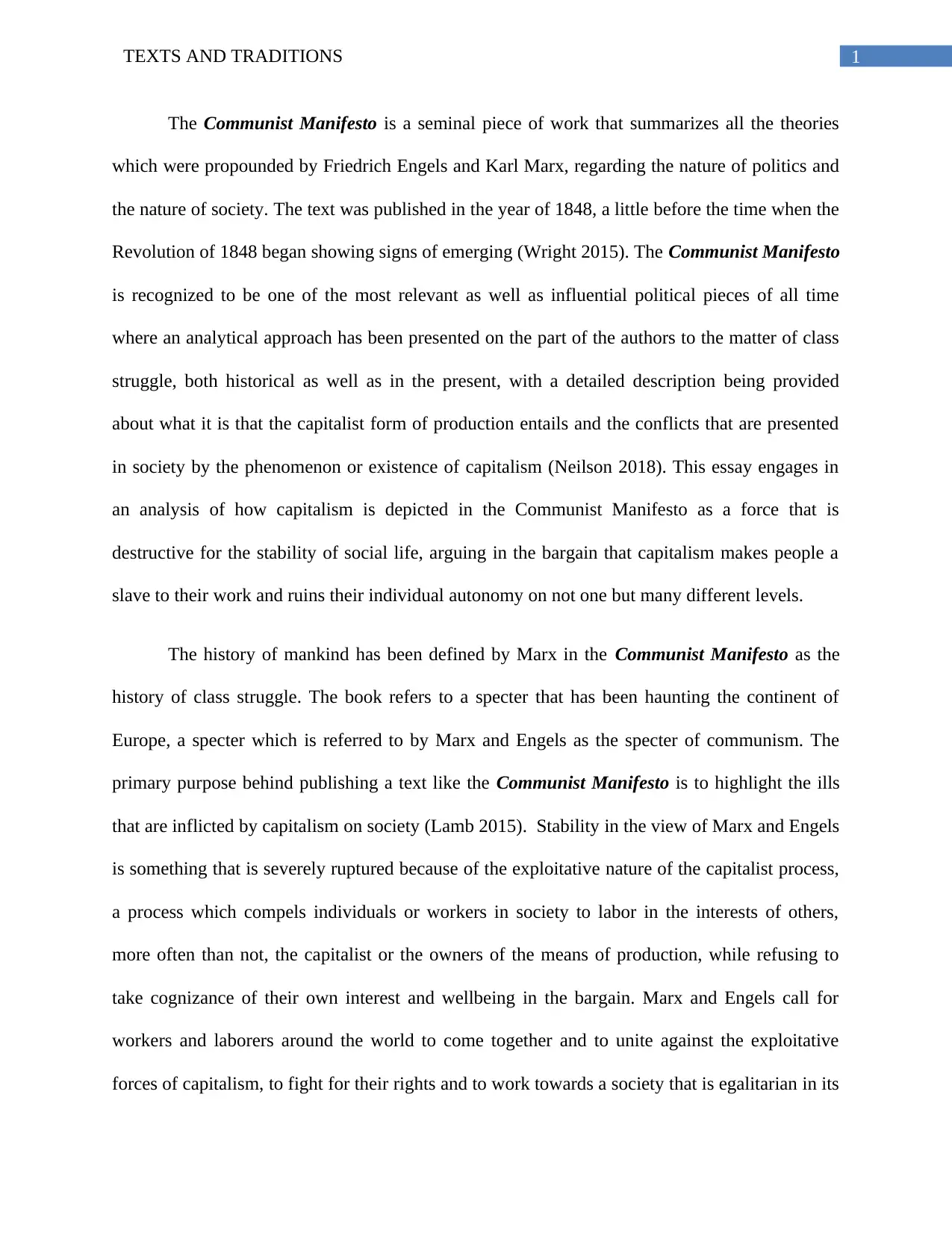
1TEXTS AND TRADITIONS
The Communist Manifesto is a seminal piece of work that summarizes all the theories
which were propounded by Friedrich Engels and Karl Marx, regarding the nature of politics and
the nature of society. The text was published in the year of 1848, a little before the time when the
Revolution of 1848 began showing signs of emerging (Wright 2015). The Communist Manifesto
is recognized to be one of the most relevant as well as influential political pieces of all time
where an analytical approach has been presented on the part of the authors to the matter of class
struggle, both historical as well as in the present, with a detailed description being provided
about what it is that the capitalist form of production entails and the conflicts that are presented
in society by the phenomenon or existence of capitalism (Neilson 2018). This essay engages in
an analysis of how capitalism is depicted in the Communist Manifesto as a force that is
destructive for the stability of social life, arguing in the bargain that capitalism makes people a
slave to their work and ruins their individual autonomy on not one but many different levels.
The history of mankind has been defined by Marx in the Communist Manifesto as the
history of class struggle. The book refers to a specter that has been haunting the continent of
Europe, a specter which is referred to by Marx and Engels as the specter of communism. The
primary purpose behind publishing a text like the Communist Manifesto is to highlight the ills
that are inflicted by capitalism on society (Lamb 2015). Stability in the view of Marx and Engels
is something that is severely ruptured because of the exploitative nature of the capitalist process,
a process which compels individuals or workers in society to labor in the interests of others,
more often than not, the capitalist or the owners of the means of production, while refusing to
take cognizance of their own interest and wellbeing in the bargain. Marx and Engels call for
workers and laborers around the world to come together and to unite against the exploitative
forces of capitalism, to fight for their rights and to work towards a society that is egalitarian in its
The Communist Manifesto is a seminal piece of work that summarizes all the theories
which were propounded by Friedrich Engels and Karl Marx, regarding the nature of politics and
the nature of society. The text was published in the year of 1848, a little before the time when the
Revolution of 1848 began showing signs of emerging (Wright 2015). The Communist Manifesto
is recognized to be one of the most relevant as well as influential political pieces of all time
where an analytical approach has been presented on the part of the authors to the matter of class
struggle, both historical as well as in the present, with a detailed description being provided
about what it is that the capitalist form of production entails and the conflicts that are presented
in society by the phenomenon or existence of capitalism (Neilson 2018). This essay engages in
an analysis of how capitalism is depicted in the Communist Manifesto as a force that is
destructive for the stability of social life, arguing in the bargain that capitalism makes people a
slave to their work and ruins their individual autonomy on not one but many different levels.
The history of mankind has been defined by Marx in the Communist Manifesto as the
history of class struggle. The book refers to a specter that has been haunting the continent of
Europe, a specter which is referred to by Marx and Engels as the specter of communism. The
primary purpose behind publishing a text like the Communist Manifesto is to highlight the ills
that are inflicted by capitalism on society (Lamb 2015). Stability in the view of Marx and Engels
is something that is severely ruptured because of the exploitative nature of the capitalist process,
a process which compels individuals or workers in society to labor in the interests of others,
more often than not, the capitalist or the owners of the means of production, while refusing to
take cognizance of their own interest and wellbeing in the bargain. Marx and Engels call for
workers and laborers around the world to come together and to unite against the exploitative
forces of capitalism, to fight for their rights and to work towards a society that is egalitarian in its
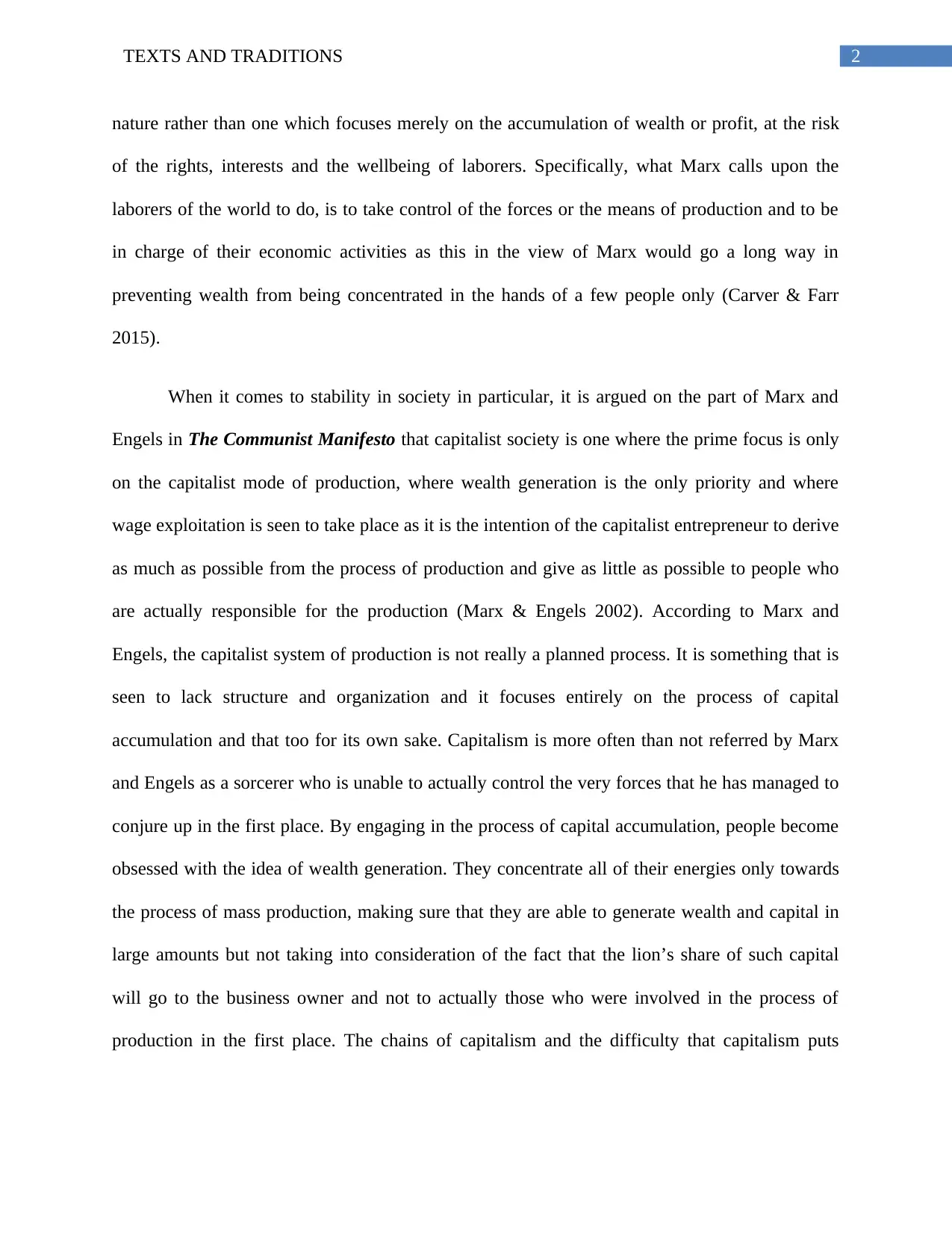
2TEXTS AND TRADITIONS
nature rather than one which focuses merely on the accumulation of wealth or profit, at the risk
of the rights, interests and the wellbeing of laborers. Specifically, what Marx calls upon the
laborers of the world to do, is to take control of the forces or the means of production and to be
in charge of their economic activities as this in the view of Marx would go a long way in
preventing wealth from being concentrated in the hands of a few people only (Carver & Farr
2015).
When it comes to stability in society in particular, it is argued on the part of Marx and
Engels in The Communist Manifesto that capitalist society is one where the prime focus is only
on the capitalist mode of production, where wealth generation is the only priority and where
wage exploitation is seen to take place as it is the intention of the capitalist entrepreneur to derive
as much as possible from the process of production and give as little as possible to people who
are actually responsible for the production (Marx & Engels 2002). According to Marx and
Engels, the capitalist system of production is not really a planned process. It is something that is
seen to lack structure and organization and it focuses entirely on the process of capital
accumulation and that too for its own sake. Capitalism is more often than not referred by Marx
and Engels as a sorcerer who is unable to actually control the very forces that he has managed to
conjure up in the first place. By engaging in the process of capital accumulation, people become
obsessed with the idea of wealth generation. They concentrate all of their energies only towards
the process of mass production, making sure that they are able to generate wealth and capital in
large amounts but not taking into consideration of the fact that the lion’s share of such capital
will go to the business owner and not to actually those who were involved in the process of
production in the first place. The chains of capitalism and the difficulty that capitalism puts
nature rather than one which focuses merely on the accumulation of wealth or profit, at the risk
of the rights, interests and the wellbeing of laborers. Specifically, what Marx calls upon the
laborers of the world to do, is to take control of the forces or the means of production and to be
in charge of their economic activities as this in the view of Marx would go a long way in
preventing wealth from being concentrated in the hands of a few people only (Carver & Farr
2015).
When it comes to stability in society in particular, it is argued on the part of Marx and
Engels in The Communist Manifesto that capitalist society is one where the prime focus is only
on the capitalist mode of production, where wealth generation is the only priority and where
wage exploitation is seen to take place as it is the intention of the capitalist entrepreneur to derive
as much as possible from the process of production and give as little as possible to people who
are actually responsible for the production (Marx & Engels 2002). According to Marx and
Engels, the capitalist system of production is not really a planned process. It is something that is
seen to lack structure and organization and it focuses entirely on the process of capital
accumulation and that too for its own sake. Capitalism is more often than not referred by Marx
and Engels as a sorcerer who is unable to actually control the very forces that he has managed to
conjure up in the first place. By engaging in the process of capital accumulation, people become
obsessed with the idea of wealth generation. They concentrate all of their energies only towards
the process of mass production, making sure that they are able to generate wealth and capital in
large amounts but not taking into consideration of the fact that the lion’s share of such capital
will go to the business owner and not to actually those who were involved in the process of
production in the first place. The chains of capitalism and the difficulty that capitalism puts
⊘ This is a preview!⊘
Do you want full access?
Subscribe today to unlock all pages.

Trusted by 1+ million students worldwide
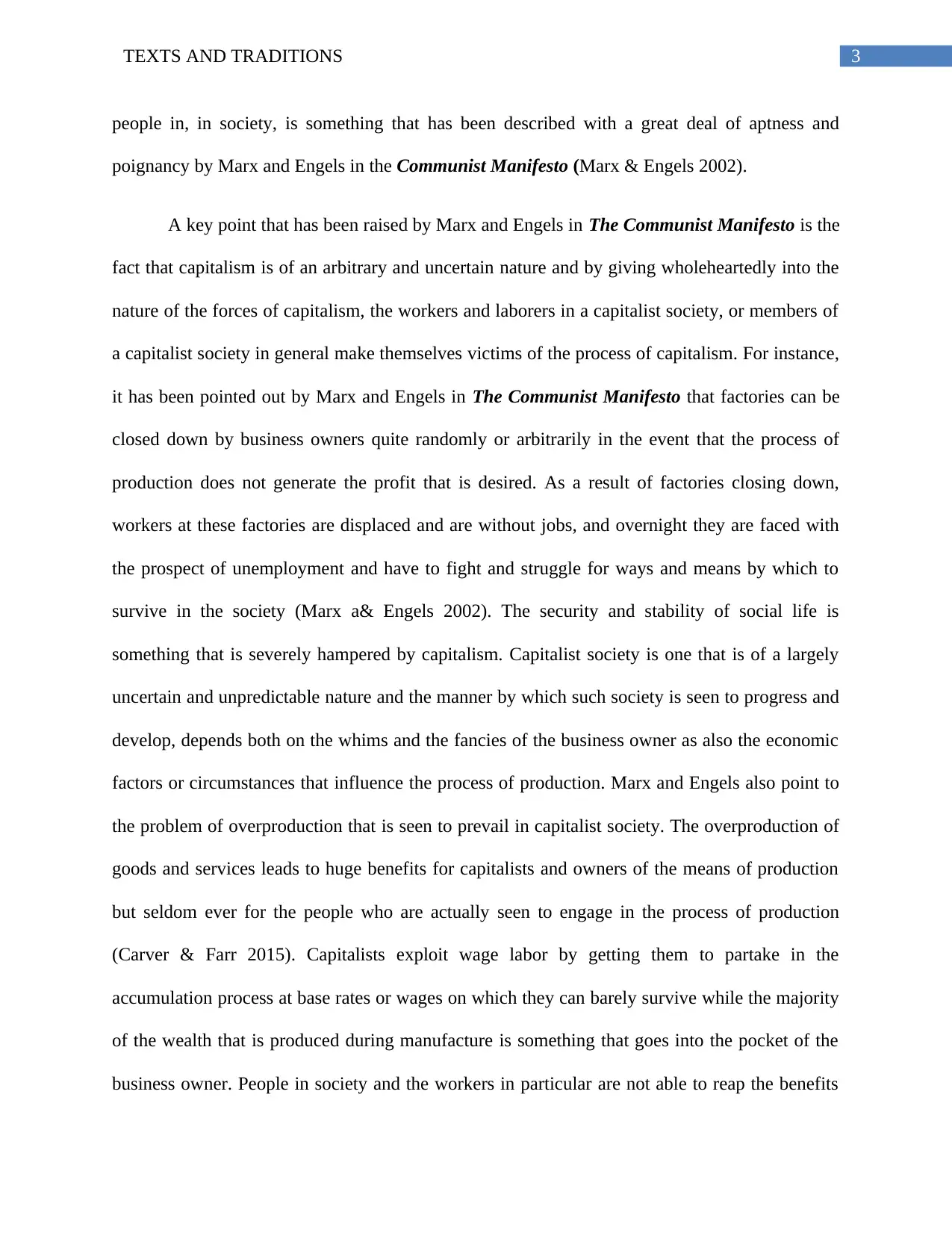
3TEXTS AND TRADITIONS
people in, in society, is something that has been described with a great deal of aptness and
poignancy by Marx and Engels in the Communist Manifesto (Marx & Engels 2002).
A key point that has been raised by Marx and Engels in The Communist Manifesto is the
fact that capitalism is of an arbitrary and uncertain nature and by giving wholeheartedly into the
nature of the forces of capitalism, the workers and laborers in a capitalist society, or members of
a capitalist society in general make themselves victims of the process of capitalism. For instance,
it has been pointed out by Marx and Engels in The Communist Manifesto that factories can be
closed down by business owners quite randomly or arbitrarily in the event that the process of
production does not generate the profit that is desired. As a result of factories closing down,
workers at these factories are displaced and are without jobs, and overnight they are faced with
the prospect of unemployment and have to fight and struggle for ways and means by which to
survive in the society (Marx a& Engels 2002). The security and stability of social life is
something that is severely hampered by capitalism. Capitalist society is one that is of a largely
uncertain and unpredictable nature and the manner by which such society is seen to progress and
develop, depends both on the whims and the fancies of the business owner as also the economic
factors or circumstances that influence the process of production. Marx and Engels also point to
the problem of overproduction that is seen to prevail in capitalist society. The overproduction of
goods and services leads to huge benefits for capitalists and owners of the means of production
but seldom ever for the people who are actually seen to engage in the process of production
(Carver & Farr 2015). Capitalists exploit wage labor by getting them to partake in the
accumulation process at base rates or wages on which they can barely survive while the majority
of the wealth that is produced during manufacture is something that goes into the pocket of the
business owner. People in society and the workers in particular are not able to reap the benefits
people in, in society, is something that has been described with a great deal of aptness and
poignancy by Marx and Engels in the Communist Manifesto (Marx & Engels 2002).
A key point that has been raised by Marx and Engels in The Communist Manifesto is the
fact that capitalism is of an arbitrary and uncertain nature and by giving wholeheartedly into the
nature of the forces of capitalism, the workers and laborers in a capitalist society, or members of
a capitalist society in general make themselves victims of the process of capitalism. For instance,
it has been pointed out by Marx and Engels in The Communist Manifesto that factories can be
closed down by business owners quite randomly or arbitrarily in the event that the process of
production does not generate the profit that is desired. As a result of factories closing down,
workers at these factories are displaced and are without jobs, and overnight they are faced with
the prospect of unemployment and have to fight and struggle for ways and means by which to
survive in the society (Marx a& Engels 2002). The security and stability of social life is
something that is severely hampered by capitalism. Capitalist society is one that is of a largely
uncertain and unpredictable nature and the manner by which such society is seen to progress and
develop, depends both on the whims and the fancies of the business owner as also the economic
factors or circumstances that influence the process of production. Marx and Engels also point to
the problem of overproduction that is seen to prevail in capitalist society. The overproduction of
goods and services leads to huge benefits for capitalists and owners of the means of production
but seldom ever for the people who are actually seen to engage in the process of production
(Carver & Farr 2015). Capitalists exploit wage labor by getting them to partake in the
accumulation process at base rates or wages on which they can barely survive while the majority
of the wealth that is produced during manufacture is something that goes into the pocket of the
business owner. People in society and the workers in particular are not able to reap the benefits
Paraphrase This Document
Need a fresh take? Get an instant paraphrase of this document with our AI Paraphraser
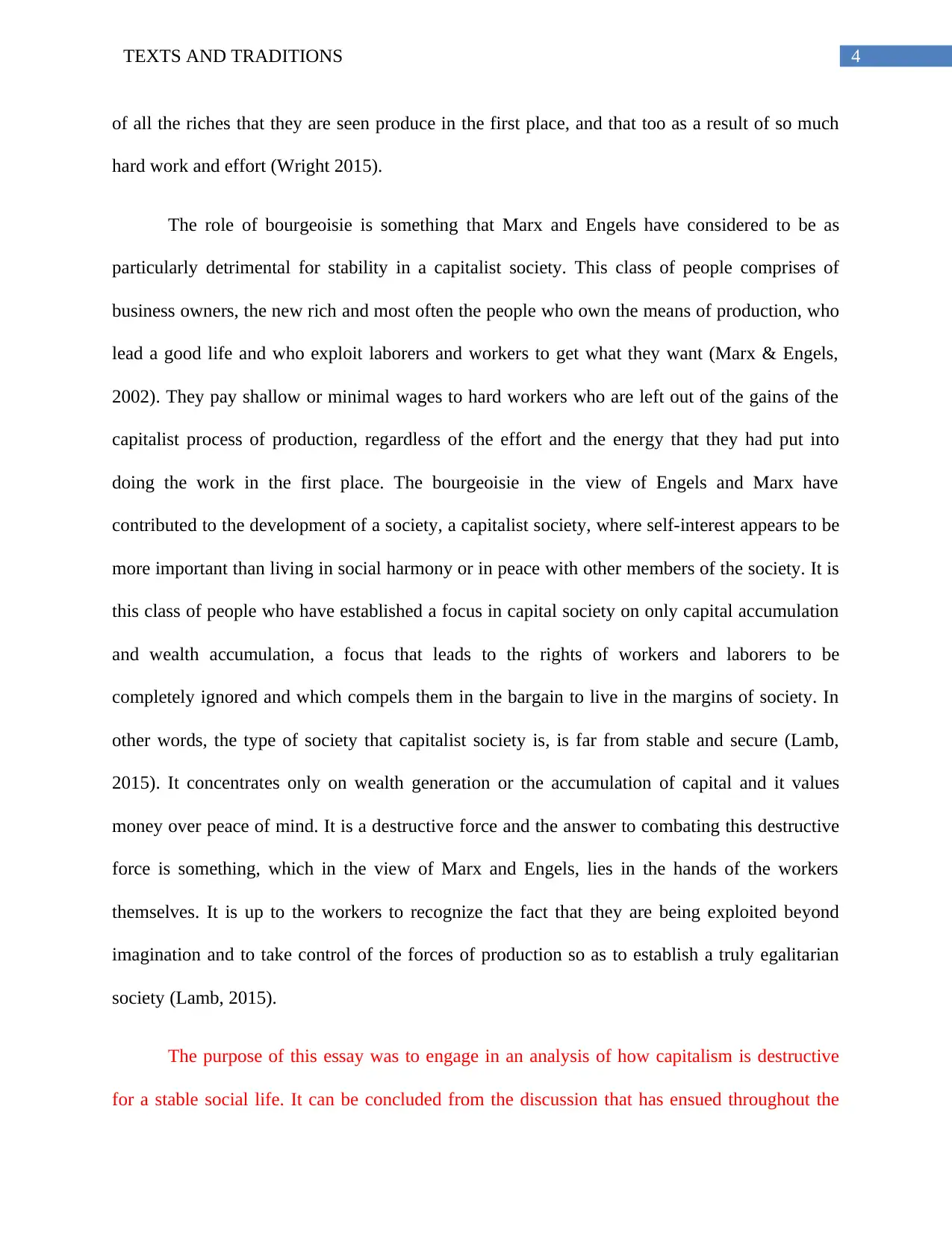
4TEXTS AND TRADITIONS
of all the riches that they are seen produce in the first place, and that too as a result of so much
hard work and effort (Wright 2015).
The role of bourgeoisie is something that Marx and Engels have considered to be as
particularly detrimental for stability in a capitalist society. This class of people comprises of
business owners, the new rich and most often the people who own the means of production, who
lead a good life and who exploit laborers and workers to get what they want (Marx & Engels,
2002). They pay shallow or minimal wages to hard workers who are left out of the gains of the
capitalist process of production, regardless of the effort and the energy that they had put into
doing the work in the first place. The bourgeoisie in the view of Engels and Marx have
contributed to the development of a society, a capitalist society, where self-interest appears to be
more important than living in social harmony or in peace with other members of the society. It is
this class of people who have established a focus in capital society on only capital accumulation
and wealth accumulation, a focus that leads to the rights of workers and laborers to be
completely ignored and which compels them in the bargain to live in the margins of society. In
other words, the type of society that capitalist society is, is far from stable and secure (Lamb,
2015). It concentrates only on wealth generation or the accumulation of capital and it values
money over peace of mind. It is a destructive force and the answer to combating this destructive
force is something, which in the view of Marx and Engels, lies in the hands of the workers
themselves. It is up to the workers to recognize the fact that they are being exploited beyond
imagination and to take control of the forces of production so as to establish a truly egalitarian
society (Lamb, 2015).
The purpose of this essay was to engage in an analysis of how capitalism is destructive
for a stable social life. It can be concluded from the discussion that has ensued throughout the
of all the riches that they are seen produce in the first place, and that too as a result of so much
hard work and effort (Wright 2015).
The role of bourgeoisie is something that Marx and Engels have considered to be as
particularly detrimental for stability in a capitalist society. This class of people comprises of
business owners, the new rich and most often the people who own the means of production, who
lead a good life and who exploit laborers and workers to get what they want (Marx & Engels,
2002). They pay shallow or minimal wages to hard workers who are left out of the gains of the
capitalist process of production, regardless of the effort and the energy that they had put into
doing the work in the first place. The bourgeoisie in the view of Engels and Marx have
contributed to the development of a society, a capitalist society, where self-interest appears to be
more important than living in social harmony or in peace with other members of the society. It is
this class of people who have established a focus in capital society on only capital accumulation
and wealth accumulation, a focus that leads to the rights of workers and laborers to be
completely ignored and which compels them in the bargain to live in the margins of society. In
other words, the type of society that capitalist society is, is far from stable and secure (Lamb,
2015). It concentrates only on wealth generation or the accumulation of capital and it values
money over peace of mind. It is a destructive force and the answer to combating this destructive
force is something, which in the view of Marx and Engels, lies in the hands of the workers
themselves. It is up to the workers to recognize the fact that they are being exploited beyond
imagination and to take control of the forces of production so as to establish a truly egalitarian
society (Lamb, 2015).
The purpose of this essay was to engage in an analysis of how capitalism is destructive
for a stable social life. It can be concluded from the discussion that has ensued throughout the
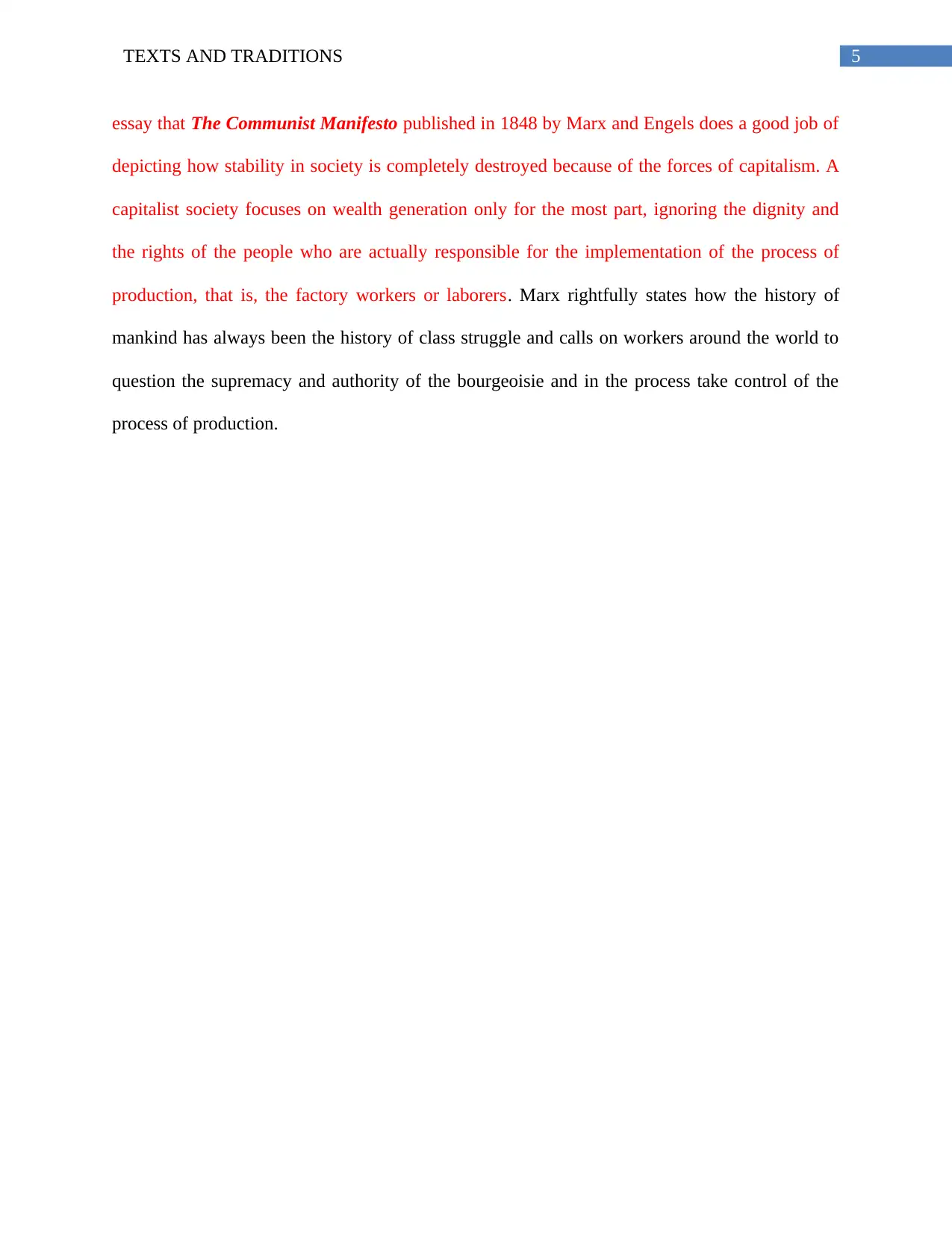
5TEXTS AND TRADITIONS
essay that The Communist Manifesto published in 1848 by Marx and Engels does a good job of
depicting how stability in society is completely destroyed because of the forces of capitalism. A
capitalist society focuses on wealth generation only for the most part, ignoring the dignity and
the rights of the people who are actually responsible for the implementation of the process of
production, that is, the factory workers or laborers. Marx rightfully states how the history of
mankind has always been the history of class struggle and calls on workers around the world to
question the supremacy and authority of the bourgeoisie and in the process take control of the
process of production.
essay that The Communist Manifesto published in 1848 by Marx and Engels does a good job of
depicting how stability in society is completely destroyed because of the forces of capitalism. A
capitalist society focuses on wealth generation only for the most part, ignoring the dignity and
the rights of the people who are actually responsible for the implementation of the process of
production, that is, the factory workers or laborers. Marx rightfully states how the history of
mankind has always been the history of class struggle and calls on workers around the world to
question the supremacy and authority of the bourgeoisie and in the process take control of the
process of production.
⊘ This is a preview!⊘
Do you want full access?
Subscribe today to unlock all pages.

Trusted by 1+ million students worldwide
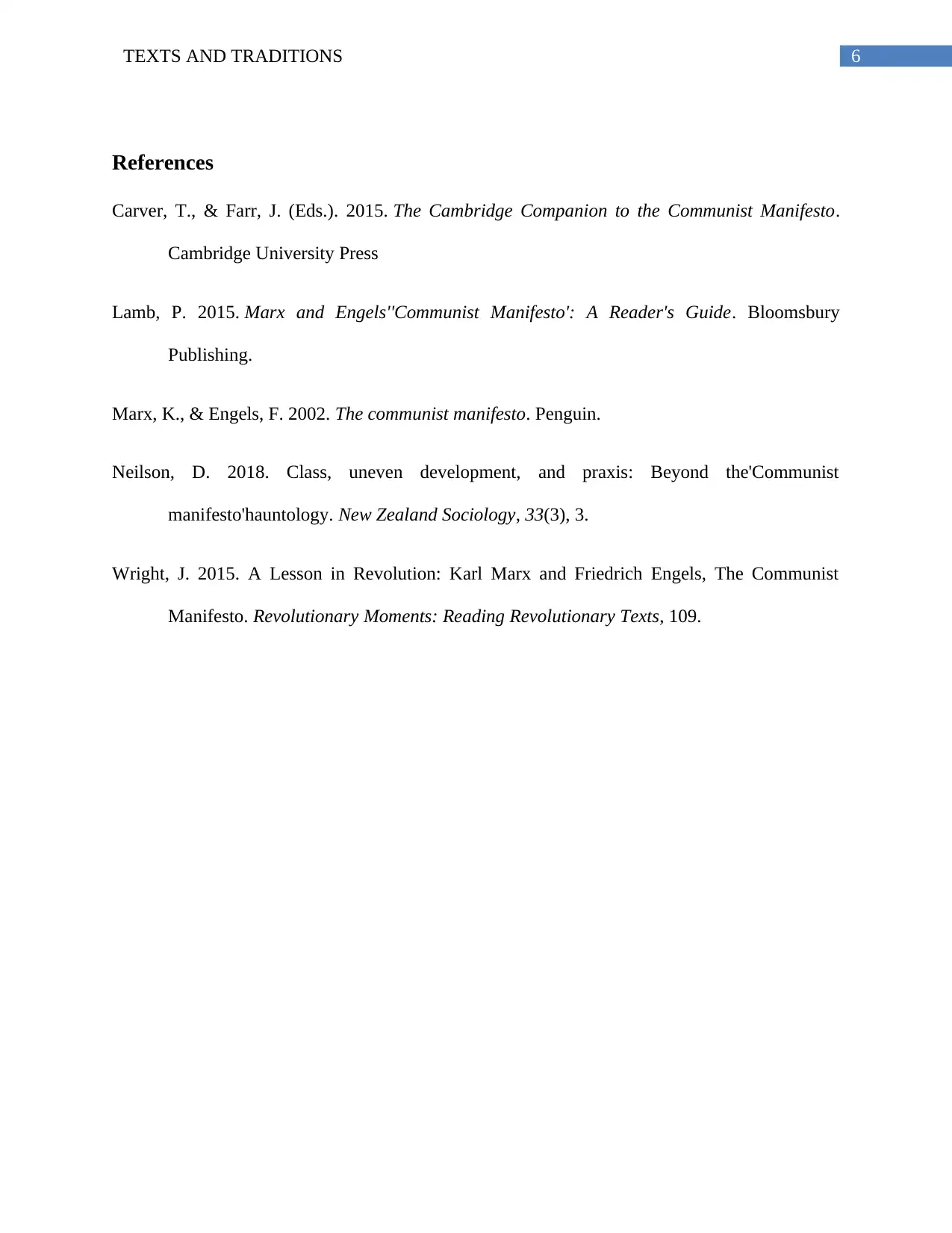
6TEXTS AND TRADITIONS
References
Carver, T., & Farr, J. (Eds.). 2015. The Cambridge Companion to the Communist Manifesto.
Cambridge University Press
Lamb, P. 2015. Marx and Engels''Communist Manifesto': A Reader's Guide. Bloomsbury
Publishing.
Marx, K., & Engels, F. 2002. The communist manifesto. Penguin.
Neilson, D. 2018. Class, uneven development, and praxis: Beyond the'Communist
manifesto'hauntology. New Zealand Sociology, 33(3), 3.
Wright, J. 2015. A Lesson in Revolution: Karl Marx and Friedrich Engels, The Communist
Manifesto. Revolutionary Moments: Reading Revolutionary Texts, 109.
References
Carver, T., & Farr, J. (Eds.). 2015. The Cambridge Companion to the Communist Manifesto.
Cambridge University Press
Lamb, P. 2015. Marx and Engels''Communist Manifesto': A Reader's Guide. Bloomsbury
Publishing.
Marx, K., & Engels, F. 2002. The communist manifesto. Penguin.
Neilson, D. 2018. Class, uneven development, and praxis: Beyond the'Communist
manifesto'hauntology. New Zealand Sociology, 33(3), 3.
Wright, J. 2015. A Lesson in Revolution: Karl Marx and Friedrich Engels, The Communist
Manifesto. Revolutionary Moments: Reading Revolutionary Texts, 109.
1 out of 7
Related Documents
Your All-in-One AI-Powered Toolkit for Academic Success.
+13062052269
info@desklib.com
Available 24*7 on WhatsApp / Email
![[object Object]](/_next/static/media/star-bottom.7253800d.svg)
Unlock your academic potential
Copyright © 2020–2026 A2Z Services. All Rights Reserved. Developed and managed by ZUCOL.




